Streamlining Transaction Banking for Corporates.

FinnAxia® Global Receivables
Simplify Collections. Strengthen Liquidity. Scale Confidently.
Learn moreThis article originally appeared in Forbes India Magazine.
The third Banking Transformation Summit set out the terms for India’s forthcoming credit revolution.
India’s financial landscape is being reforged. The canvas is Bharat itself, its ambitions demanding a banking system built for inclusion and empowerment. At the third edition of the Nucleus Software Presents CNBC-TV18 Banking Transformation Summit, a new blueprint was unveiled. The mission was clear; to build an ‘AI-Powered and Credit-Driven’ ecosystem that serves the next billion. This was a declaration of a fundamental evolution, where intelligence is embedded into the very fabric of finance, and credit becomes the lifeblood of national growth.
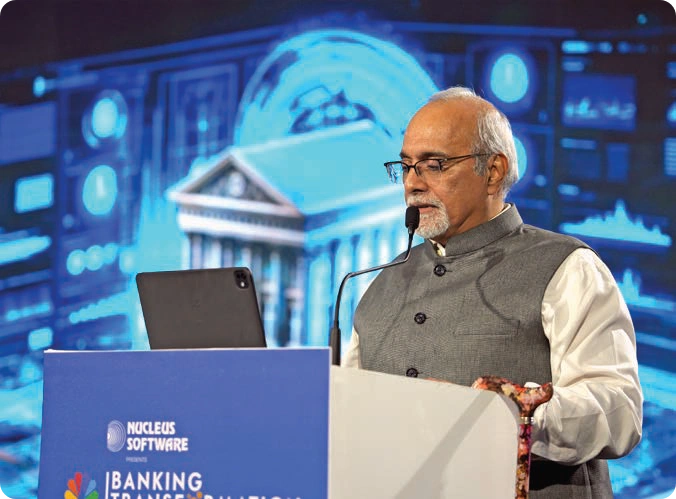 The road to growth begins with unfettered ambition. In his virtual keynote, M. Nagaraju, Secretary of the Department of Financial Services, Ministry of Finance, laid out a vision for global scale. “We are currently the fourth largest economy, but we have only two banks in the top 10 globally,” he stated, framing it not as an observation but as a strategic area of concern. This vision of scale, he clarified, prioritizes robust organic growth, fuelled by MSMEs, infrastructure, and startups. Achieving this growth is fundamental to the realization of Viksit Bharat by 2047, raising the credit-to-GDP ratio to 120% – 130%, and bringing 300-350 million citizens into the financial mainstream in the process.
The road to growth begins with unfettered ambition. In his virtual keynote, M. Nagaraju, Secretary of the Department of Financial Services, Ministry of Finance, laid out a vision for global scale. “We are currently the fourth largest economy, but we have only two banks in the top 10 globally,” he stated, framing it not as an observation but as a strategic area of concern. This vision of scale, he clarified, prioritizes robust organic growth, fuelled by MSMEs, infrastructure, and startups. Achieving this growth is fundamental to the realization of Viksit Bharat by 2047, raising the credit-to-GDP ratio to 120% – 130%, and bringing 300-350 million citizens into the financial mainstream in the process.
The technological backbone for this expansion must be Artificial Intelligence. During his own keynote address, RBI Deputy Governor, M. Rajeshwar Rao, detailed its role in giving a financial identity to “millions of credit invisibles”. However, this power demands rigorous governance. The Deputy Governor issued a stark warning on latent vulnerabilities, from algorithmic bias and model opacity to the systemic risk of synchronized failures.
Parag Bhise, CEO & Executive Director, Nucleus Software, elaborated on how AI-driven platforms and intelligent infrastructure can operationalize this vision, enabling scalable, secure, and inclusive banking solutions that serve the next billion customers and drive transformative growth.
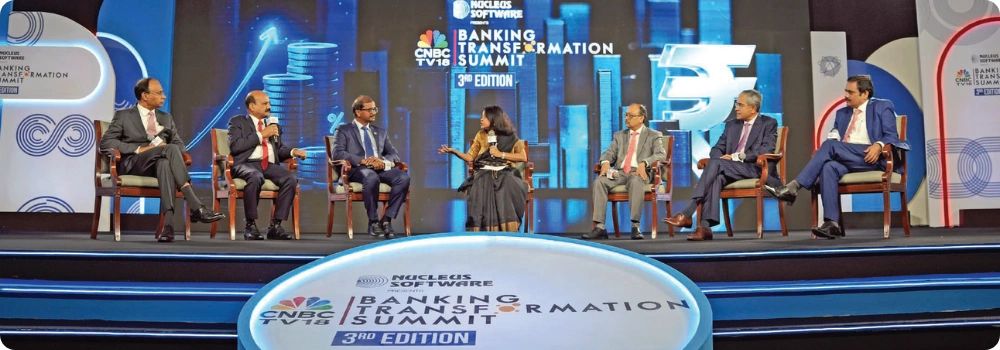
This high-level ambition found its engine in the practical world of lending and liability. A powerful panel of banking chiefs, including SBI’s Amara Ram Mohan Rao, Bank of India’s Rajneesh Karnatak, Bank of Baroda’s Dr. Debadatta Chand, and Federal Bank’s K.V.S. Manian, diagnosed the credit pulse. While credit in the RAM (Retail, Agriculture, MSME) segment is booming with over 15% growth, a critical challenge emerged in the form of the shifting nature of deposits, as household savings move to capital markets. Simultaneously, the panel unveiled a silent war against sophisticated fraud, particularly ‘mule accounts.’ Rajiv Anand of IndusInd Bank illustrated the alarming ingenuity of scamsters, while PNB’s Ashok Chandra detailed the immense costs of integrating advanced Enterprise Fraud Risk Management systems to safeguard the foundational currency of banking – trust.
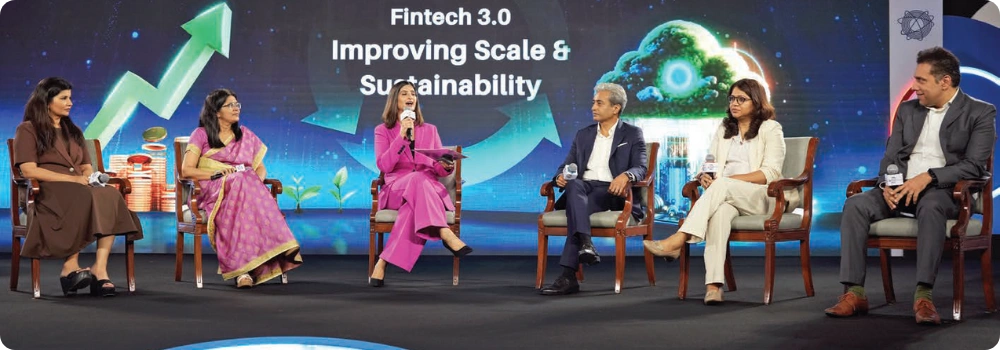
Adding depth to this transformation is India’s dynamic fintech ecosystem. In a panel discussion on ‘Fintech 3.0: Improving Scale & Sustainability’, featuring luminaries like Sohini Rajola, ED – Growth at NPCI, Rishi Chhabra, Country Manager – India at Visa, Upasana Taku, Co-founder & CFO of Mobikwik, Santosh Aggarwal, CEO of Paisabazaar, Amrita Sirohia, Co-founder of INDMoney, and Anubrata Biswas, MD & CEO at Airtel Payments Bank, the conversation focused on nurturing innovation that endures. Audiences learned how Airtel Payments Bank became India’s third-largest mobile banking platform by pivoting to a ‘safe second account’ model, and the rise of India’s vaunted UPI digital public infrastructure as a foundation of the credit revolution, seamlessly linking payments with empowerment.
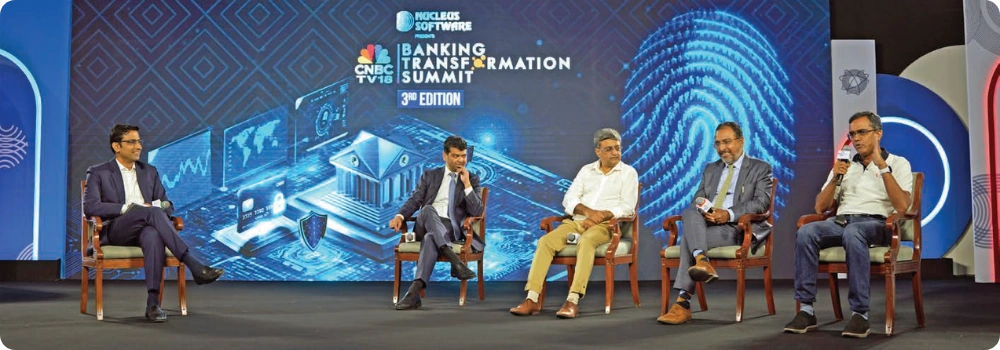
Finally, heads of NBFCs gathered for a discussion on ‘Credit for the Next Billion,’ providing a critical, ground-level perspective. Leaders from Mahindra Finance, L&T Finance, SBFC, and Piramal Finance – Raul Rebello, Sudipta Roy, Aseem Dhru, and Jairam Sridharan, respectively – detected a K-shaped recovery persisting in the credit market. The panel concurred that lender sentiments remain cautious following recent stress. Still, there is hope that fiscal stimuli might free up disposable incomes and potentially revive demand.
There was also time to honour those who embody the resilience of India’s banking system. Zarin Daruwala, former CEO of Standard Chartered Bank, and Shanti Ekambaram, Deputy Managing Director of Kotak Mahindra Bank, were felicitated for their illustrious careers, spanning decades of disruption, and serving as a powerful testament to the power of individual brilliance.
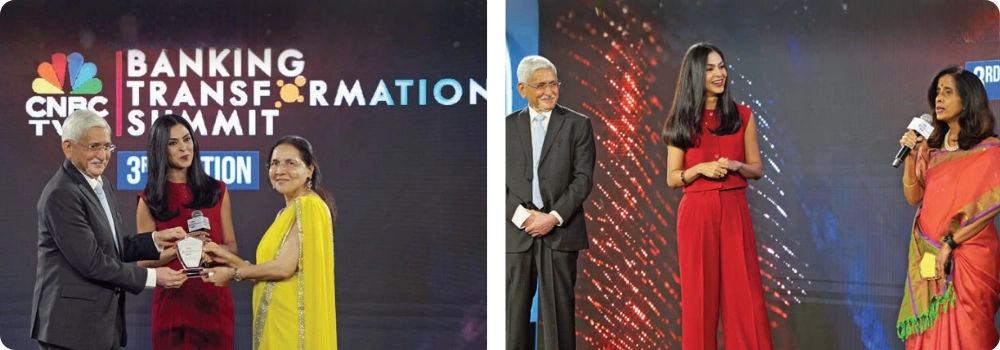
Another renowned visionary, Vishnu R Dusad, Co-founder and Managing Director of Nucleus Software, participated in a spotlight interview on ‘Building Scalable & Secure Systems’. Having witnessed several landmark changes in the banking sector over three decades, he was the right person to help viewers envision what a future ready, intelligent infrastructure for India’s banks and NBFCs might look like.
The Banking Transformation Summit helped crystallize a future where technology, policy, and prudent banking converge as a unified triad with a mission to build a system that scales for Bharat. Every speaker that followed remained cognizant of their role in this transformation. Each panel set a sequence for action. It became clear that the path from ambition to 2047 runs through product, governance and capital. This is, after all, the architecture of aspiration, purpose-built to serve a nation on the rise.